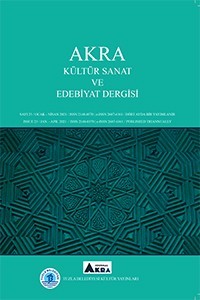Timothy Mo’nun Ekşi-Tatlı (Sour Sweet) ve Kazuo Ishıguro’nun Çocukluğumu Ararken (When We Were Orphans) Romanlarının Edward Said’in Öteki Kavramı Bağlamında İncelenmesi
Bu çalışmanın amacı, İngiltere’de sömürgecilik sonrası edebiyat yelpazesinde öne çıkan Timothy Mo’nun Ekşi-Tatlı (Sour Sweet) ve Kazuo Ishiguro’nun Çocukluğumu Ararken (When We Were Orphans) romanlarını Edward Said’in Oryantalizm (Orientalism) eserinde ele aldığı ‘ötekilik’ (otherness) kavramı bağlamında incelemektir. Çalışma boyunca söz konusu romanların Edward Said’in Doğu ve Batı kavramlarının sadece insanlar tarafından adlandırılan coğrafi bölgelerden ibaret olduğunu; bu bölgelerin her ikisinin de bir tarihi, geleneği, düşüncesi, hayal gücü kelime hazinesi olduğunu ve bu nedenle bu ikisi arasındaki ayrımın bir kurmacadan ibaret olduğu iddiasını destekledikleri üzerinde durulmuştur. Eser incelemelerine geçmeden önce İkinci Dünya Savaşı sonrası günümüzde emperyalizm olarak bilinen çağdaş sömürgeciliğin tanımına ve ortaya çıkışına değinilerek eserlerin yazıldığı döneme ilişkin gerekli bilgiler sunulmuştur. Ayrıca emperyalizmin etkilerinin edebiyata ne şekilde yansıdığından bahsedilerek Edward Said’in bu bağlamdaki rolüne ve ‘oryantalizm’ tanımına yer verilmiştir. Daha sonra ilk olarak Çinli yazar Timothy Mo’nun Ekşi-Tatlı romanı daha sonra da Japon yazar Kazuo Ishıguro’nun Çocukluğumu Ararken romanı Edward Said’in ‘öteki’ kavramı bağlamında incelenmiştir. İnceleme sonunda ‘sömürgecilik sonrası’ (postcolonial) yazarların sömürgecilik sonrası meselelere bakış açıları birbirinden farklı olsa da kültürel kimlik ve ötekileştirmeden kaynaklanan sorunlar ve ait olma isteğinin her iki romanda da yer aldığı sonucuna varılmıştır. Ayrıca ister Doğulu ister Batılı olsun herkesin yaşadığı koşullara göre kendini yaşadığı topluma ait hissetmeme duygusunu tecrübe edebileceği ve bu nedenle bu hissin Batılıların iddia ettiği gibi sadece Doğululara has bir his olmadığı sonucuna varılmıştır.
The Analysis Of Timothy Mo’s Sour Sweet and Kazuo Ishiguro’s When We Were Orp-hans Within The Framework Of The Other
This paper aims to analyse the novels that are foregrounded as the works of postcolonial literature in England; Timothy Mo’s Sour Sweet and Kazuo Ishiguro’s When We Were Orphans within the frame of The Other Edward Said refers to in his work Orientalism. The study focuses on the fact that the novels confirm Edward Said’s claims as to the fact that the concepts of the East and the West are nothing but geographical regions named by human beings both of which has its own history, tradition, thought, imagination and vocabulary and thus any sort of discrepancy between them is fictional. Before the analysis of the novels, a background information as to the period in which the works were written with the definition and existence of imperialism that came into existence after The Second World War has been presented. In addition to this, how imperialism was reflected into the literature of the era, the role of Edward Said in this regard and his definition of orientalism has been presented. Then, the novels Timothy Mo’s Sour Sweet and Kazuo Ishiguro’s When We Were Orphans have been examined in the light of Edward Said’s concept of the other. It has been concluded that although the postcolonial writers have different approach to postcolonial issues, the problems caused by cultural identity and alienation and the desire for belonging are found in both novels. Moreover, it has been concluded that Eastern or Western anyone can experience the feeling of unable to feel belonging to somewhere else and thus this feeling is not unique for the eastern as claimed by the westerns.
___
- Atal, Yogesh. (2004). “Outsides as Insiders: The phenomenon of Sandwich Culture-prefatorial to a possible Theory”. The Indian Diaspora: Dynamics of Migration. Jayaram ed. New Delhi: Sage publications India Pvt. Ltd.
- Hall, L (1995). New nations, new selves: The novels of Timothy Mo and Kazuo Ishiguro. In A.R. Lee (Ed.). Other Britain other British: Contemporary multicultural fiction (pp. 90-110). London: Pluto Press.
- Hand, F. (1995). “How British are the Asians?” Wasafiri, 22, 9-13.
- Ho, E.Y. L. (2000). Timothy Mo. Manchester: Manchester University Press.
- Ishıguro, Kazuo (2000). Çocukluğumu Ararken (When We Were Orphans): İngiltere: Faber and Faber.
- Menteşe, Oya Batum. (2010). “Batı Edebiyatında Sömürgecilik Sonrası (Post-colonial) Edebiyatı Kavramı ve Üç Yazar: V.S. Naipaul, Timothy Mo, Kazuo Ishiguro” Bir Düşün Yolculuğu II Babil’den Sonra: Edebiyat, Sanat, Çeviri ve Eleştiri Üzerine Türkçe ve İngilizce Yazılar Ankara: Bilgesel.
- Mo, Timothy. (1985). Sour Sweet. New York: The Vintage Library of Contemporary World Literature.
- Parker, D. (1995). Through different eyes: The cultural identities of young Chinese people in Britain. Aldershot: Avebury.
- Said, Edward. (1977). “Introduction” Orientalism. London: Penguin.
